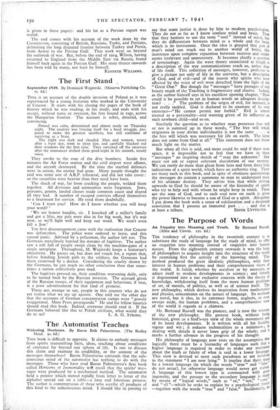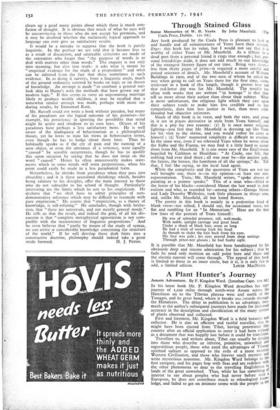The Purpose of Words
An Enquiry into Meaning and Truth. By Bertrand Russell. (Allen and Unwin. 12s. 6d.) THE tendency of philosophy in the twentieth century is to substitute the study of language for the study of mind, to offer us enquiries into meaning instead of enquiries into human nature. From the eighteenth century onwards it was the hope of philosophers to acquire insight into the structure of the world by examining •first the activity of the knowing mind. This method produced the great idealistic philosophies, with their interest in human problems and their comprehensive views of the world. It failed, whether by accident or by necessity, to adjust itself to modern developments in science 3 • and latterly it degenerated into a too exclusive concern with the theory of knowledge, withdrawing itself from the more human problems of art, of morals, of politics, as well as of science itself. The new philosophy, which derives its inspiration from mathematics and physics, concentrates on the nature of language. Its methods are novel, but it also, in its extremer forms, neglects, or even sweeps aside, the human problems, and a comprehensive view of the world it regards as a chimera.
Mr. Bertrand Russell was the pioneer, and is now the veteran, of the new philosophy. His present book, without being historical, gives us a bird's-eye view of the whole movement and of its latest developments. It is written with all his lucidity, vigour and wit ; it reduces technicalities to a minimum ; dealing with details it never loses grip of the whole; and it marks a further advance in the progress of his thought. His philosophy of language now rests on the assumption that logically there must be a hierarchy of languages such that higher language is required in order to make any statement about the truth or falsity of what is said in a lower language. This view is devised to meet such paradoxes as are involved in the statement " I am now lying." It implies that there mos! be a lowest language (in which the words " true " and " false do not occur), for otherwise language would never get started. A language of this lowest type is constructed with gal, ingenuity, and the passage to the secondary language is mate by means of " logical words," such as " or," " not," " some and " all "—which he seeks to explain by a psychological thew/. —together with the words " true " and " false." Incidentally, he
clears up a good many points about which there is much con- fusion of thought. It is obvious that much of what he says will be unconvincing to those who do not accept his premises, and it may be doubted whether the exclusively logical approach to language can ever give us satisfactory results.
It would be a mistake to suppose that the book is purely linguistic. In the preface we are told that it became less so as a result of discussion, and admirable criticisms are made of the extremists who forget that " the purpose of words is to deal with matters other than words." The enquiry is not only into meaning, but also into truth : it asks what is meant by " empirical evidence for the truth of a proposition " and what can be inferred from the fact that there sometimes is such evidence. In so doing it surveys, from a linguistic angle, much of the ground ordinarily covered by books on logic or on theory of knowledge. An attempt is made " to combine a general out- look akin to Hume's with the methods that have grown out of modern logic." If this seems to some an unpromising marriage likely to produce weakly children, it, may be recalled that a somewhat similar attempt was made, perhaps with more en- during results, by Immanuel Kant.
Mr. Russell could not write a book without paradox, but many of his paradoxes are the logical outcome of his premises—for example, his persistence in ignoring the possibility that mind might be active and obedient to its own laws. Others of his paradoxes have perhaps a less satisfactory basis. He is well aware of the inadequacy of behaviourism as a philosophical theory, yet he loves to state his views in behaviourist terms, even though he has to hedge 'about them later. Thus he habitually speaks as if the cry of pain and the naming of a seen object, or even the utterance of a sentence, were equally " caused " by sensible occurrences, though he has to qualify this upon occasion by saying that he does not insist on the word " caused." Hence he often unnecessarily makes state- ments which to some minds will seem preposterous, when his point could easily be made in a less paradoxical form.
Nevertheless, he shrinks from paradoxes when they pass into absurdity ; and it is these occasional shrinkings which, besides being salutary to his disciples, offer the main interest to those who do not subscribe to his school of thought. Particularly interesting are the limits which he sets to his empiricism. He declares that " we shall have to admit principles of non- demonstrative inference which may be difficult to reconcile with pure empiricism." He asserts that " empiricism, as a theory of knowledge, is self-refuting." He concludes, though with hesita- tion, that " there are universals, and not merely general words." He tells us that the result, and indeed the goal, of all his dis- cussion is that "complete metaphysical agnosticism is not com- patible with the maintenance of linguistic propositions." And • he even believes that " partly by means of the study of syntax, we can arrive at considerable knowledge concerning the structure of the world." If he will develop these dark hints into a constructive doctrine, philosophy should indeed take a great































 Previous page
Previous page